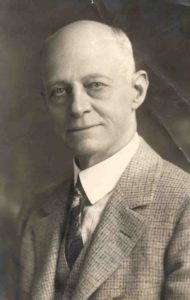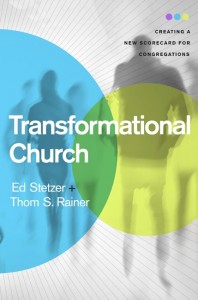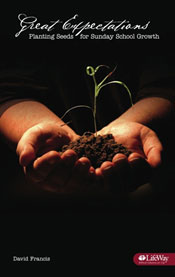 Throughout the month of August, my friends who serve as the leaders of Sunday School in Baptist state conventions will be expounding—and expanding—some topics from my newest little book, Missionary Sunday School. You can download the book free to your computer at www.lifeway.com/davidfrancis or to an iPad at the iTunes store (http://itunes.apple.com/us/artist/david-francis/id14461861).
Throughout the month of August, my friends who serve as the leaders of Sunday School in Baptist state conventions will be expounding—and expanding—some topics from my newest little book, Missionary Sunday School. You can download the book free to your computer at www.lifeway.com/davidfrancis or to an iPad at the iTunes store (http://itunes.apple.com/us/artist/david-francis/id14461861).
The book—and the daily articles you’ll read on this blog—attempts to answer this question: “What might a Sunday School look like if it saw itself as a missionary enterprise: thinking and acting out of a missionary mindset?” The book is written in honor of America’s greatest Sunday School missionary, Stephen Paxson. Paxson organized over 1,300 new Sunday Schools enrolling over 83,000 across the Midwest in the 1800s. He encouraged and strengthened more than 1,700 existing schools with 131,000 additional participants. His remarkable story is woven throughout the book.
The book’s three chapters are built around three building blocks of a missionary Sunday School: One Mission, His Story, Every Person.
The one mission of Sunday School is transformation. Personal spiritual transformation in the lives of individuals who are becoming more and more like Jesus. Congregational transformation within churches that are acting more and more like the body of Christ. Cultural transformation that makes the communities around the churches more and more reflect the impact of the kingdom of God. The Sunday School movement has a rich history and heritage of this kind of transformational impact. In the United States, the spread of a constitutional republic across the continent is interlaced with the spread of a transformational movement that helped ensure that the citizens of that republic would be a literate people with a solid moral foundations. That movement was called Sunday School.
His Story—the Bible—is the textbook of the Sunday School. The centerpiece of the movement is Bible teaching and learning. Sunday School without Bible study is not Sunday School. The movement holds to the belief “all the Bible for all of life.” The old hymn that says, “I love to tell the Story, for some have never heard…” also says “I love to tell the Story, for those who know it best, seem hungering and thirsting, to hear it like the rest” and “’tis pleasant to repeat, which seems it time I tell it, more wonderfully sweet.”
Every person reminds us that Sunday School is for everyone. A missionary Sunday School embraces the missionary principle of the people group. Jesus commanded us to make disciples of all peoples. One of the most significant things a Sunday School class can do is clearly and specifically identify the people group it is responsible for reaching, teaching, and ministering to. The people group my wife Vickie and I teach is pre-Kindergartners. What’s yours? 3rd graders? Middle school boys? High school girls? Young married adults? Without kids? With kids? Parents? Empty nesters? Seniors? I asked this question recently during a conference and heard some great ideas. One of my favorites was “wives of deployed servicemen.” Another was “parents of troubled teens.” A few months ago, a lady identified her people group as “widows over the age of 90.” When I asked where she got prospect names, she answered immediately “the obituaries.” That is missionary mentality at work! What under-reached people groups are in your community? Could you start a Sunday School type ministry on a Tuesday afternoon at an apartment complex? A Saturday morning Bible club at a mobile home park? My friend Bruce Raley, after being hospitalized on a Saturday night, helped start a class for the people group, “medical professionals who work swing shift.” The class met faithfully at 10:00 pm on Saturday nights.
Middle school boys? High school girls? Young married adults? Without kids? With kids? Parents? Empty nesters? Seniors? I asked this question recently during a conference and heard some great ideas. One of my favorites was “wives of deployed servicemen.” Another was “parents of troubled teens.” A few months ago, a lady identified her people group as “widows over the age of 90.” When I asked where she got prospect names, she answered immediately “the obituaries.” That is missionary mentality at work! What under-reached people groups are in your community? Could you start a Sunday School type ministry on a Tuesday afternoon at an apartment complex? A Saturday morning Bible club at a mobile home park? My friend Bruce Raley, after being hospitalized on a Saturday night, helped start a class for the people group, “medical professionals who work swing shift.” The class met faithfully at 10:00 pm on Saturday nights.
Knowing your people group will even make the welcome time in your worship service more productive. I call it “fishing in a barrel!” Instead of just greeting the folks immediately around you, look across the worship center for those in your people group who may not yet be part of a group or class. Then get over there and invite them! You can be a missionary right at church!
I am looking forward to reading all the articles this month. I hope you’ll join me in checking in each day. I just subscribed so I don’t have to remember! Many blessings as you lead a missionary minded Sunday School!
_____________________________________
David Francis, Director of Sunday School LifeWay Church Resources
 This month at Sunday School Leader.com, we are focusing on five principles of effective Sunday School and small group work that have stood the test of time and are as effective today as they have ever been. I challenge you to invest a few minutes every day at this blog. Your ministry in your group will improve, and after 31 days of exploring the possibilities, you will walk away with a deeper appreciation for Sunday School and an appreciation for the commitment your church has made to make disciples through its small group strategy.
This month at Sunday School Leader.com, we are focusing on five principles of effective Sunday School and small group work that have stood the test of time and are as effective today as they have ever been. I challenge you to invest a few minutes every day at this blog. Your ministry in your group will improve, and after 31 days of exploring the possibilities, you will walk away with a deeper appreciation for Sunday School and an appreciation for the commitment your church has made to make disciples through its small group strategy.
